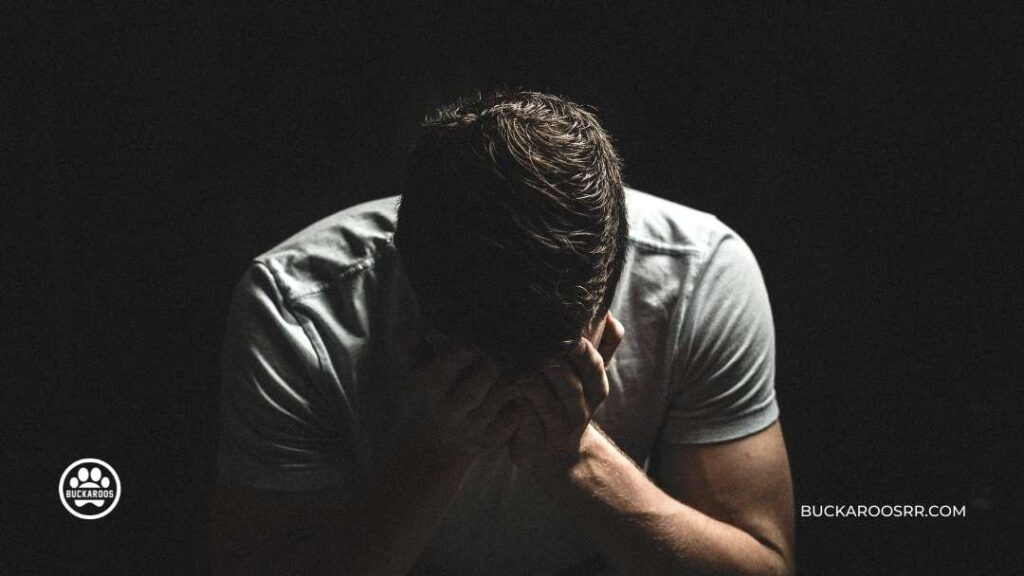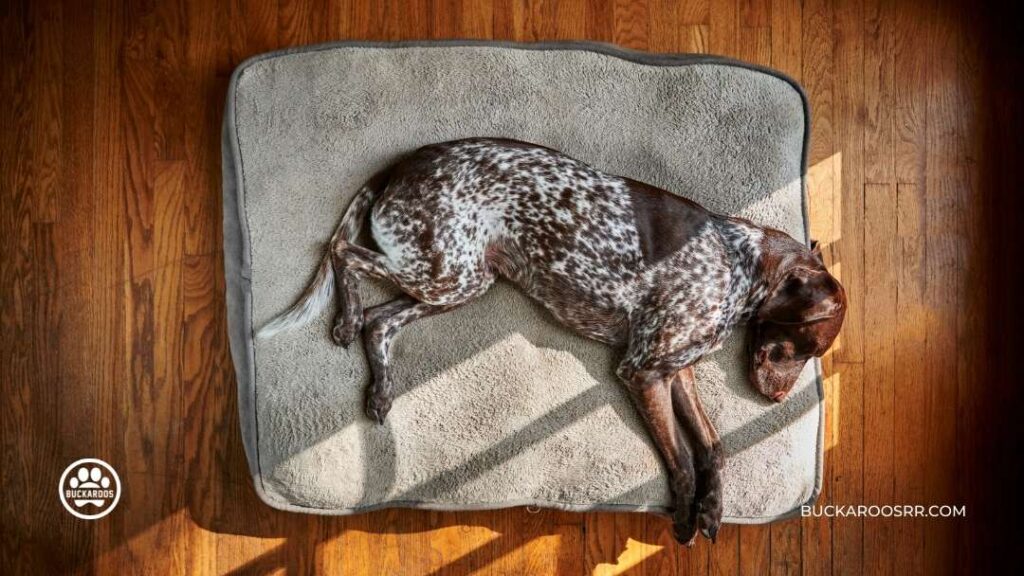Dealing With The Stages Of Grief Of Losing The Family Dog blog from Buckaroos 360. When a person loses a pet, several stages of grief may ensue. The death of a pet can trigger the same emotions you feel when losing a close human family member or friend. It’s normal if your life feels upside down and you’re experiencing doubt about how to handle everything. The depression after the loss of a pet is endless.
Understandably, the stages of pet loss grief from senior citizens can be no different than someone in their 20s; after all, they are just as alike. If you feel like you’re struggling or unsure with your emotions due to the loss of your pet, it’s important to remember that what you’re feeling is very normal.
There are five stages of grief after losing a pet. You may feel one particular emotion, but it doesn’t mean another emotion will not surface during the mourning process. And don’t be too hard on yourself if this happens – be sure you’re being kind to yourself simultaneously.

Stage 1: Denial and Shock
When we experience a traumatic event, it can be challenging to process. Our brains may go into “survival mode” and block out the memories of the event. This is known as denial and shock; a good example would be losing a pet suddenly.
It is human nature to want to deny the existence of something that causes us pain. Denial is a defense mechanism that allows us to protect ourselves from the hurt and anxiety of facing brutal truths.
Denial and shock can help us cope in the short term, but eventually, we must come to terms with what has happened. Otherwise, the trauma events can start taking over our lives and cause great distress. In some cases, denial can lead to severe problems, such as addiction, mental health issues, and relationship problems.

Stage 2: Pain and Guilt Dealing With The Stages Of Grief Of Losing The Family Dog
Pain and guilt are two of the most challenging emotions to deal with. They can be incredibly overwhelming and can lead to a feeling of hopelessness. It is essential to understand that pain and guilt are not your faults and that you can do something to change the way you feel. No one is ever ready to face or realize how it feels to lose a beloved pet, but when it hits us, it’s hell!
One of the best things you can do to deal with pain is to talk to someone who understands. A therapist or counselor can help you work through these feelings and develop a plan to cope with them. You can also find support groups for people dealing with similar emotions.
Talking to others who understand what you are going through can be a great way to feel less alone and find new ways to deal with your guilt. Sometimes we keep blaming ourselves for the loss. In this mourning time, we need to accept that death is inevitable and no good will come if we blame ourselves. Moreover, the guilt will only worsen the condition of you and your loved ones.

Stage 3: Anger and Bargaining
Anger and bargaining are two of the most common emotions experienced during grief. Bitterness arrives when reality sets in and is often directed at yourself, others, or the situation. It can manifest as feelings of frustration, resentment, or even rage. It’s normal to feel terrible and irrational at such a difficult time, but we need to realize that there is no use in giving in to our emotions and allowing them to steer us down the wrong path.
Bargaining is usually an attempt to regain control of the situation. This may involve making deals with yourself or everyone else around you.

Stage 4: Depression and Loneliness
Depression and loneliness are two of the most common mental health problems people face worldwide. They can often go hand in hand, as depressed people often feel lonely and isolated. In this case, the loss of your pet is the prime reason for depression. Every individual in the family has a special bond with the pet, and now that the happy-go-lucky soul has departed, they miss it and feel lonely in its absence.
With the progressing stages of grief at this time, it can lead one to acknowledge the finality of the separation they must face. Some people withdraw into their world while others try and reach out. In both cases, pet mourners need support and patience. It is important to talk and relate your inner feelings to someone. It can be a professional therapist, a close friend, or anyone trustworthy and ready to lend an ear. The feeling of remorse and sadness should be shared to help you heal.
If you struggle with depression and loneliness after your pet’s death, seek help. There are many resources available for you. Talk to your doctor or a mental health professional to get started on the road to recovery. Try to acquire new hobbies or ease your grief by spending time with other dogs. Whatever helps you realize that the beloved member of the family is not coming back, you should go for it.

Stage 5: Acceptance – Your New Normal Life
Your new everyday life will be full of acceptance that the lost one is not returning. You will accept yourself for the loss and what you have been through and move on with immense hope.
This is the most challenging stage in the grieving process. Acceptance does not mean forgetting or closing the door on your pet; it means embracing the sweet, beautiful life they lived and all of their wonderful memories.
Understandably it’s complicated to put your emotions into words when you go through the process of believing that your pet has passed away. You might not have any other pets again that is a perfect match for you, but at the same time, there will always be sentimental memories of their lives. And those alone would always outshine the sadness of their passing over time.
But life is full of surprises, and hopefully, you will meet another puppy looking for a home, and you both may find solace in each other.

Dogs are family. – Missing The Old Dog
Dogs are our loyal, furry companions who are always there for us, no matter what. They provide us with unconditional love and companionship and ask for nothing in return. They are always happy to see us, whether we’ve been gone for five minutes or hours. They are always there to comfort us when we’re feeling down and to celebrate with us when we’re feeling up. In short, there’s no denying that they will be missed once they are gone. But how long is it normal to grieve the loss of a dog? Well, you may never know for sure.
Accident, ailment, old age, no matter the reason, losing a family member is a painful course that every individual must encounter, sooner or later. It is not unusual to wonder why are animal deaths sadder than human deaths – well, that’s because the emotional connection we develop with these animals is remarkable and unparalleled. It is sane to miss your dog for the rest of your life because they are irreplaceable. There is no particular remedy and no one single way of dealing with the stages of grief after losing the family dog.
My Pet Died, And I Can’t Get Over It!
Despite losing a loved one, it is important to know they are not entirely gone. By cherishing their memories, you can still be close to these individuals and even come to terms with the fact that they have moved on – leaving behind cherished memories for us and the years ahead. We all want what’s best for our beloved pets and letting go of their things may seem hard, but there are specific steps everyone needs to take to move on and thrive in this cruel world. Breaking through denial into acceptance can be one such milestone for moving forward after the departure of your family pet.





